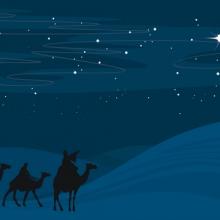Consumerism
[T]HE MAJORITY OF THE men and women of our time continue to live daily in situations of insecurity, with dire consequences. ... One cause of this situation, in my opinion, is in our relationship with money, and our acceptance of its power over ourselves and our society. Consequently the financial crisis which we are experiencing makes us forget that its ultimate origin is to be found in a profound human crisis, in the denial of the primacy of human beings. We have created new idols. The worship of the golden calf of old (Exodus 32:15-34) has found a new and heartless image in the cult of money and the dictatorship of an economy which is faceless and lacking any truly humane goal. The worldwide financial and economic crisis seems to highlight the distortions and above all the gravely deficient human perspective, which reduces [people] to one of [their] needs alone, namely, consumption. Worse yet, human beings themselves are nowadays considered as consumer goods which can be used and thrown away. We have begun a throw- away culture. This tendency is seen on the level of individuals and whole societies; and it is being promoted ...
While the income of a minority is increasing exponentially, that of the majority is crumbling. This imbalance results from ideologies that uphold the absolute autonomy of markets and financial speculation, and thus deny the right of control to States, which are themselves charged with providing for the common good. ... I encourage the financial experts and the political leaders of your countries to consider the words of Saint John Chrysostom: “Not to share one’s goods with the poor is to rob them and to deprive them of life. It is not our goods that we possess, but theirs.”
Christianity can quickly devolve into caste systems, where faith communities are divided by the haves and the have-nots, the rich and the poor. Instead of unifying ourselves in Christ, we are dividing ourselves by how much money we can afford to spend.
How much money is required to be a Christian? Imagine how much money we’ve spent throughout our lifetime on “Christian” activities and products (not including tithing or mission-related donations) — now imagine if we gave this money to people who really needed it.
“Consumer Christianity” has turned our faith into a set of costs, and it’s becoming increasingly costly to maintain the Christian status quo. In John 2, the Bible tells the riveting story of Jesus entering the Temple and becoming furious at what He sees: vendors who have turned something holy into a commercial marketplace. Jesus is irate, and he basically tears the place apart because of their sin. But how different are our churches today?
I asked a small group of second-graders what they would like to find inside their mailboxes. That was after we read a story about a goose who opened her mailbox and found a kite. I expected to hear answers of things: video games, toys or basketballs. But the first student who raised her hand looked at me with sincere, big brown eyes and said, "I'd like to find a letter from my dad."
In my classroom, my kids say the profoundest things.
As we entered the holiday season, I thought about the answer that student gave me. I thought about what other of my 7-, 8- and 9-year-olds were saying about the holiday season.
For three years, I lived and worked in a large housing project in Louisville, Ky. I was a middle-class, white graduate student, and my background clouded how I saw the people around me. But I finally began to see clearly.
“Faith is recognizing that if at Christmas Jesus became like us, it was so we might become more like him,” wrote the well-known preacher and activist William Sloan Coffin. He goes on to add, “We know what this means; watching Jesus heal the sick, empower the poor, and scorn the powerful, we see transparently the power of God at work.”*
Christmas really is about seeing the power of God at work, but far too often pastors and churches fail to tell this story. Oh sure, we preach about Mary and Joseph, Jesus being born in a Bethlehem manger, and the Magi following a star to find him and offer gold, frankincense, and myrrh. My fear is that the story has grown familiar and routine. We have forgotten its power and no longer see its challenge.
In Matthew’s Gospel, the Magi seek out Jesus after hearing of his birth. In order to find him they ask King Herod where they can find the new king. This, of course, is news to Herod who is surprised to learn that his title has been claimed by a baby. Herod consults his advisors and then reacts with the expected calmness of a leader anticipating a conflict, which is to say his response is not calm at all.
This story is an announcement that Jesus has arrived to challenge the powerful. The Messiah was not born meek and mild.
There are many ways to celebrate the coming of the light in this dark season of the year, including the Winter Solstice, Hanukah, Kwanza, and Christmas. Christmas is supposedly a Christian holiday, but the orgy of consumption that accompanies this holiday in the United States makes that questionable. How ironic it is that people celebrate the birth of a poor baby born in a stable (as the story goes) by spending billions on "stuff" that will ultimately end up in overflowing landfills. However, Christian or not, many are swept along by the dominant media message: "Buy gifts for your loved ones to show them how much they are loved and how precious they are."
The pressure can be hard to resist.
This may not present a problem for those who practice a Christianity that is conformed to consumer culture, but for those who seek to follow Jesus it challenges us with one of his core teachings: "You cannot serve both God and mammon." Mammon: wealth, riches, money, stuff.
Are you put out that a community nativity display was nixed by a city council? Did a checkout clerk greet you with "Happy Holidays" instead of "Merry Christmas"? Maybe Christmas music annoys you when the Advent fast hasn't even arrived?
Not me. I am not compelled to "reclaim" or "rescue" Christmas from the many who ignore and the few who despise its magnificent origins.
How can I be anxious or offended? I am in too much awe of its startling truth: that a baby is God, gasping for air, clasping for mother's milk, flailing his small limbs in a feed trough; taking on my frailty, contingency, vulnerability, that I might partake in his everlasting nature.
The baby is now Lord of all things visible and invisible, forever "one of us," still bearing his now glorified, nail-scarred flesh at the Father's side, making all things new for all persons, hallowing the far-flung cosmos — matter's maker now made matter, redeeming every atom and every stoney heart. This reality overpowers me with its brilliant mystery.
Ah — I LOVE this time of the year!
Some people wait with bated breath for duck season, some for deer season, but for me it is all about Christmas season. That's right, I'm one of those lefty liberals that have declared a War on Christmas. Yes! Sign me up for the War on Christmas!
But maybe not for the reasons you might imagine.
While I am signing up to help in a War on Christmas, I'm not on, what by default gets called, the “non-Christian” side. I’m also not signing up for the side that news pundits falsely purport as the “Christian” side. If anything, I’d make the argument that the dominant face of Christianity, as it is seen on television and promoted through news programming, is itself far from what Christianity is supposed to be. It is a sort-of white-washed, sanitized version of Christianity that every year presents an increasingly cleaned up version of the Christmas story to the viewing public.
Religion is far too judgmental. Surveys show that many people think that, especially a new generation of young people who — more than ever before — are checking the “none of the above” religious affiliation box.
I get it. But religious leaders tend to be judgmental about many of the wrong things; they are not making moral judgments on the important questions. So I am going to be judgmental, as a religious leader, about something I just read.
A recent Harris International and World Vision poll showed that Americans plan to spend more this Christmas season on consumer gifts than they did last year, but give less to charities and ministries that help the poor. Many say they are less likely to give a charitable gift as a holiday present — a drop from 51 percent to 45 percent.
So we will have more Christmas presents this year, but less help for the poor. While retailers, economists, and politicians may rejoice at the news about higher consumer spending this year, the lower levels of support for the ones Jesus called “the least of these” should legitimately bring some moral judgments from the faith community.
Indeed, the Matthew 25 scripture that this text is taken from is one of the few and most judgmental passages in all the New Testament. About some things, Jesus was judgmental. The Gospel clearly says that how we treat the hungry, the thirsty, the stranger, the naked, the sick, and the prisoner, is how we treat Jesus. That’s is pretty judgmental, especially when you go on to read what will happen to those who ignore Jesus in this way.
But rather than just being judgmental, let’s do something about it. Let’s start “A Christmas Tithe.”
"When you really drop out of the national religion of shopping you gain all kinds of time and a capacity to do what you might really prefer to do … and you gain a chance to be about the number one priority, which is to try to ease the burden on the poorest people in our world, especially those who are stuck in warzones." – Kathy Kelly, Peace Activist
This year my hometown of Chicago hosted the NATO summit. Thousands of protestors came to voice their concerns about war and the economy. Along with peace journalist Bob Koehler, I had the great fortune to interview one of those protesters, Kathy Kelly. (You can listen to the interview on my Voices of Peace podcast here.) Kathy is a three-time Nobel Peace Prize nominee and lives a fascinating life. She is an advocate of nonviolence on a global scale and has been arrested more than 60 times in the U.S and abroad for nonviolent protests. Kathy has traveled to Afghanistan and Iraq more than 26 times, remaining in dangerous combat zones during U.S.-led military strikes. She risked her life by going to Baghdad during the United State’s infamous “Shock and Awe” campaign.
Kathy was the perfect guest to help us explore our overarching question at Voices of Peace – How do we build a lasting, sustainable global peace? She knows firsthand about the violence in our world and she’s on a mission to transform that violence into peace.
ASHEVILLE, N.C. -- In the days following Thanksgiving, there's already Black Friday and Small Business Saturday and Cyber Monday to kick off the holiday shopping season.
Now, a group of charities and corporate sponsors is urging Americans to make the Tuesday after Thanksgiving just as powerful a day of giving to those in need.
It's called #GivingTuesday, and organizers say it's gaining momentum as the holiday shopping season approaches.
"We have two days that are good for the economy. Here is a new day that is good for the soul," said Henry Timms, deputy executive director of strategy, innovation and content of 92nd Street Y in New York City, where the idea was hatched.
There are 800 partners, from non-profits to corporations, including heavy hitters such as Microsoft and Sony. Timms credits the social-media community with growing the momentum.
Once there was a crowd of about 2,000 shoppers gathered for the early morning opening of a local Wal-Mart.
It was the morning after Thanksgiving Day in Valley Stream, New York, an occasion commonly known as “Black Friday” throughout the United States.
As the opening hour of operation approached, the crowd grew quickly in size, but it also increased with anxiety and anger, as many had waited throughout the cold and dark night, some as long as eight hours. The masses were more than ready to move into the warmth, brightness, and seasonal buying bliss of their neighborhood Wal-Mart.
When the store manager finally unlocked the front entrance, the massive and eager crowd erupted with energy and passionately pushed into the store like a tidal wave. In doing so, through the sheer physical force of mass purchasing power, the swarm of shoppers broke through – and eventually broke down – the Wal-Mart doors.
I’m coming to terms with the realization that I’m a big, fat fake. But at least I’m in good company.
Amy’s birthday was last Sunday. We had just arrived in Portland, so we went to a fancy-pants restaurant, situated several hundred feet above the skyline, with a view of the entire surrounding city, the Willamette River and Mount Hood. We shared a bottle of wine, enjoyed outstanding service and indulged on gourmet food to celebrate her ever-growing tenure as an occupant of our planet.
The bill for the night was nearly enough to cover groceries for our family for up to two weeks.
We could manage it; we knew it was pricey before we got there. And it was fairly easy to justify too. We were making memories. It was an other step in the courtship, helping us fall in love with our new city. We had worked hard over the past eight years, establishing a church in Colorado, struggling to pay bills at times, and we’re now enjoying some material fruits of our labor.
What bullshit.
Seriously, how does anyone really justify spending that kind of money on one meal? After all, from our vantage point on the 30th floor, I could see scads of people below, standing on street corners, tucked in under sleeping bags and beneath cardboard boxes, walking wearily from one job to the next, hoping to pull together enough to make rent.
I talk to folks a lot about what role the church should have in contemporary life in serving people. There’s the trend of “third space” ministry, getting out of the four walls of the church building and meeting people in different, typically “secular” contexts.
One defining trait of postmodern life is the blurring of previous boundaries. Just like work now can go with us beyond the cubicle, people think about faith in different terms than just sitting in a sanctuary on Sunday morning. There are entire ministries that do all of their work online, broadcasting services, or recording them for people to view on demand. There are blogs (like mine) whose authors consider what they do to be a ministry, though not in the typical sense of the word.

Christmas light display at the Yodobashi-Akiba Department store in Akihabara City, Japan. Image via http://bit.ly/usVkKm
Beneath the usual clamor of the holiday season is the faint din of anger.
Once again many have raised their voices regarding the “secularization” of Christmas. Armed with slogans such as “Keep Christ in Christmas,” they ensure we don't forget that this is a holiday about Jesus of Nazareth.
Common greetings such as, “Happy Holidays” are met with a defensive, counter-greetings of “… and Merry Christ-mas to you too.”
Try using the abbreviation “Xmas.” Some folks believe this is literally “X-ing” Jesus out of the Christmas!
What seems to be glaringly absent from these vocal Christmas Crusaders is any protest against the gross consumerism, greed and selfishness that arrives every year with holiday season.
Census Shows 1 In 2 People Are Poor Or Low-Income; Evangelical Group Links Climate Change And Poverty; Rick Perry Stresses Values On Iowa Bus Tour Kick-Off; Occupy 2.0? Church Leaders Join Movement; The Looming Death Of The Death Penalty; Christ and Consumerism: 'Priceless' At What Price? (OPINION)
Today is Black Friday, the unofficial holiday immediately following Thanksgiving. Today, businesses open very early, offering reduced prices on all manner of consumer items. Customers are encouraged to flood the aisles in search of a good deal on all kinds of things - from DVDs to appliances - but, above all, electronics.
It's time to move from a narrowly defined shareholder economy to a stakeholder economy that includes workers, consumers, the environment , and future generations -- all in our economic calculations and decision-making.
At the Wild Goose Festival in North Carolina last weekend, I was able to speak with Anna Clark, author of Green, American Style, president and founder of EarthPeople, a green consulting firm, and a contributor to Taking Flight: Reclaiming the Female Half of God's Image Through Advocacy and Renewal. Anna has a heart for equipping churches to make small and big changes for the sake of creation care and stewardship of the earth's resources. How can Christians do this, you ask? Read our conversation to find out.
On December 13, a Tacoma-based jury declared five Disarm Trident Now Plowshares activists "guilty" of trespass, felony damage to federal property, felony injury to property, and felony conspiracy to damage property.












